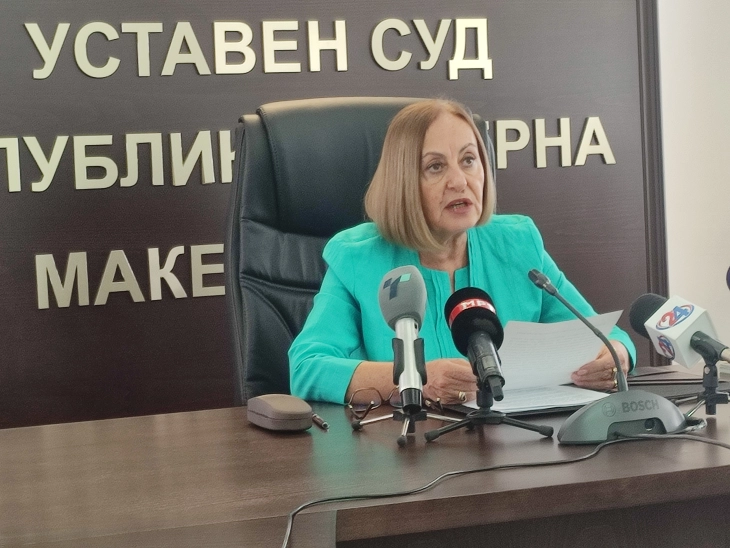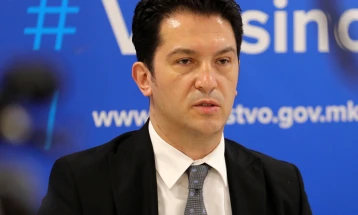Constitutional Court won't assess constitutionality of Law on Ratification of Prespa Agreement
- The Constitutional Court unanimously decided on Thursday not to launch a procedure on assessing the constitutionality of the Law on the Ratification of the Final Agreement for the Settlement of the Differences, commonly referred to as the "Prespa Agreement", and rejected the motion for assessing the constitutionality of the Decree promulgating the Law, said Constitutional Court President Dobrila Kacarska.

Skopje, 21 September 2023 (MIA) - The Constitutional Court unanimously decided on Thursday not to launch a procedure on assessing the constitutionality of the Law on the Ratification of the Final Agreement for the Settlement of the Differences, commonly referred to as the "Prespa Agreement", and rejected the motion for assessing the constitutionality of the Decree promulgating the Law, said Constitutional Court President Dobrila Kacarska.
She added that according to the Constitutional Court, the Law on Ratification of the Prespa Agreement is in accordance with the Constitution, i.e. it remains part of the legal order of the state.
"A thorough procedure was conducted on the case, including a preparatory session and a comprehensive analysis of the constitutional court practice. The Constitutional Court believes that the Decree does not contain legal norms. It is not a regulation, it is part of the procedure, and when the Constitutional Court repeals or annuls a Law, the Decree is not repealed separately," Kacarska said.
Thursday's discussion at the Constitutional Court for the most part focused on the non-signing of the Decree by former president of the country, Gjorgje Ivanov, i.e. his duty according to Article 75, paragraph 3 of the Constitution to sign the Decree.
"In a broader context, in the spirit of the Constitution and its application, the will of the lawmakers is personified with the will of the citizens, as opposed to the will of just one person, because the system of governance in our country is a parliamentary democracy, not a monarchy. Sovereignty comes from the citizens and belongs to the citizens, and the Constitution and laws apply equally to everyone, including the President of the Republic," Kacarska pointed out.
On the other hand, she added, the Republic has assumed international obligations according to the agreement and although the president was left with a longer period to sign the Decree, he still did not sign the Decree, so it was published without his signature, and only with the signature of the parliament speaker.
"Another thing to consider is also the fact that this agreement is submitted to the UN organization and is signed by a mediator as a witness, Matthew Nimetz. A law can be promulgated only once, and in this particular case, it was promulgated. The Constitution has achieved its goal, the Law has been promulgated," said Kacarska.
As regards Article 110 of the Constitution, i.e. the competence of the Constitutional Court in terms of international agreements, Kacarska said that the Court does not have the competence to decide on alignment of international agreements with the Constitution.
"This means that there are no conditions for launching an analysis into the validity of the allegations in the motions submitted regarding the content of the agreement," she said, adding that assuming the Law is repealed, the agreement still remains.
According to Kacarska, the Constitutional Court can only assess whether the Law on the Ratification has been adopted in a prescribed procedure and by a constitutionally authorized body, which is the Parliament.
"The court does not go into the content of the international agreement until the law on the ratification of the agreement is repealed or annulled. In this specific case the so-called Prespa Agreement, as well as any other international agreement, remains in force and creates an international legal obligation for the state until it is amended, terminated or annulled, however, according to the international rules for agreements between states," Kacarska noted.
Todor Petrov, President of the World Macedonian Congress (WMC), Ivica Efremov and Angelovski Stiv from Bitola, Solza Grcheva and Tome Todorovski are the petitioners of the motions to assess the constitutionality of the laws.
According to certain allegations contained in the motions, the Decree promulgating the Law on Ratification of the Final Agreement for the Settlement of the Differences has not been signed by the President of the Republic of Macedonia at the time, which makes that act contrary to Article 51 of the Constitution. The motions argue that the contested acts violate the rule of law. Since the President of the Republic has not signed the Decree, it is stated that the contested law is not valid and cannot produce legal effect, i.e. publishing the Law without the signature of the President of the Republic of Macedonia is a gross violation of the Constitution. In some of the motions, the petitioners claim among other that the agreement is null and void because it has been in violation of the international right to self-determination of nations, the right of each nation to choose its own name, identity, national symbols, etc., and in violation of the Vienna Convention on the Law of Treaties.
Photo: MIA







